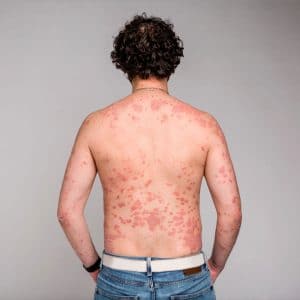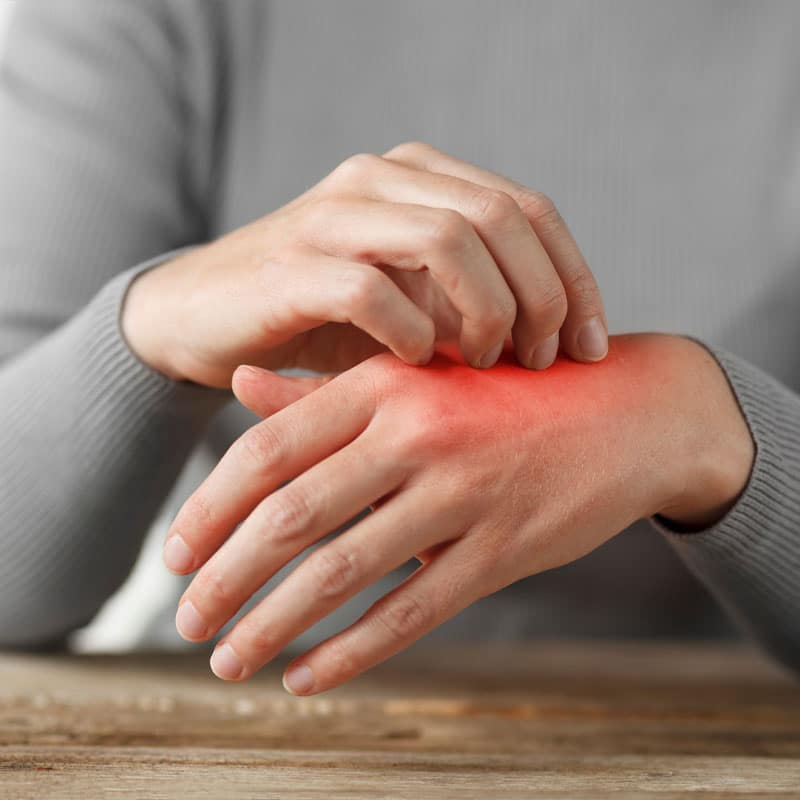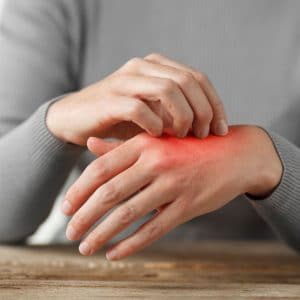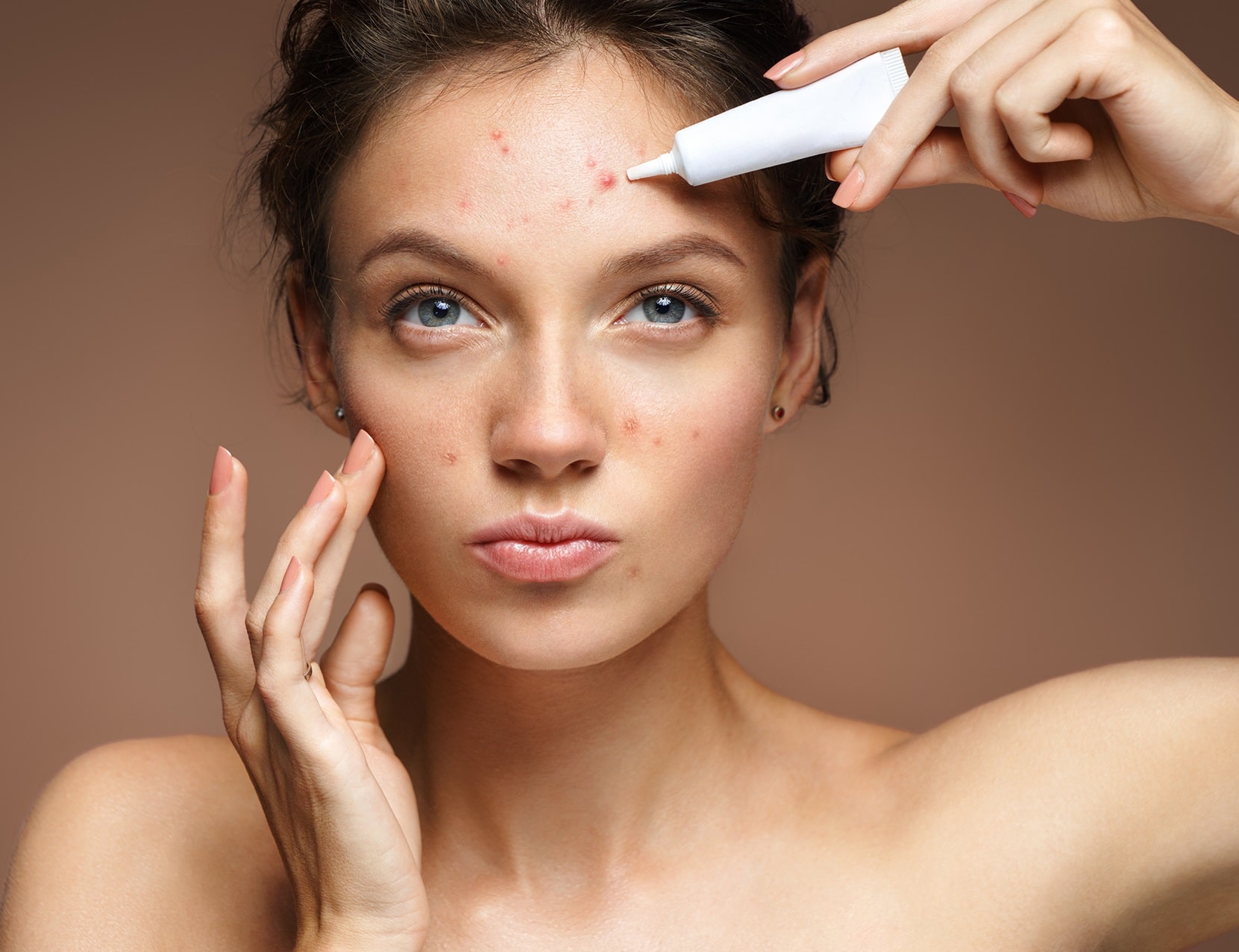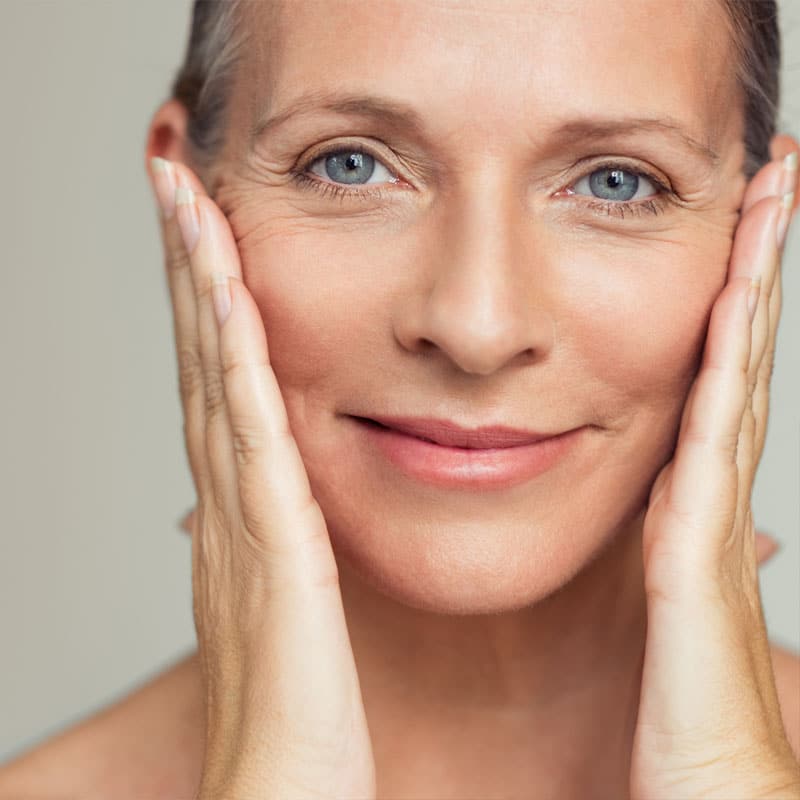Your skin protects your organs and body from microscopic viruses, bacteria, and fungi. Being the largest organ of the body, your skin is susceptible to a variety of skin conditions. Your skin can alert you to an issue in another part of your body. Dry, flaky skin, hives, and irritated skin are hard to ignore.
Skin Disorders
Holistic Treatment for Acne, Eczema, Psoriasis and more
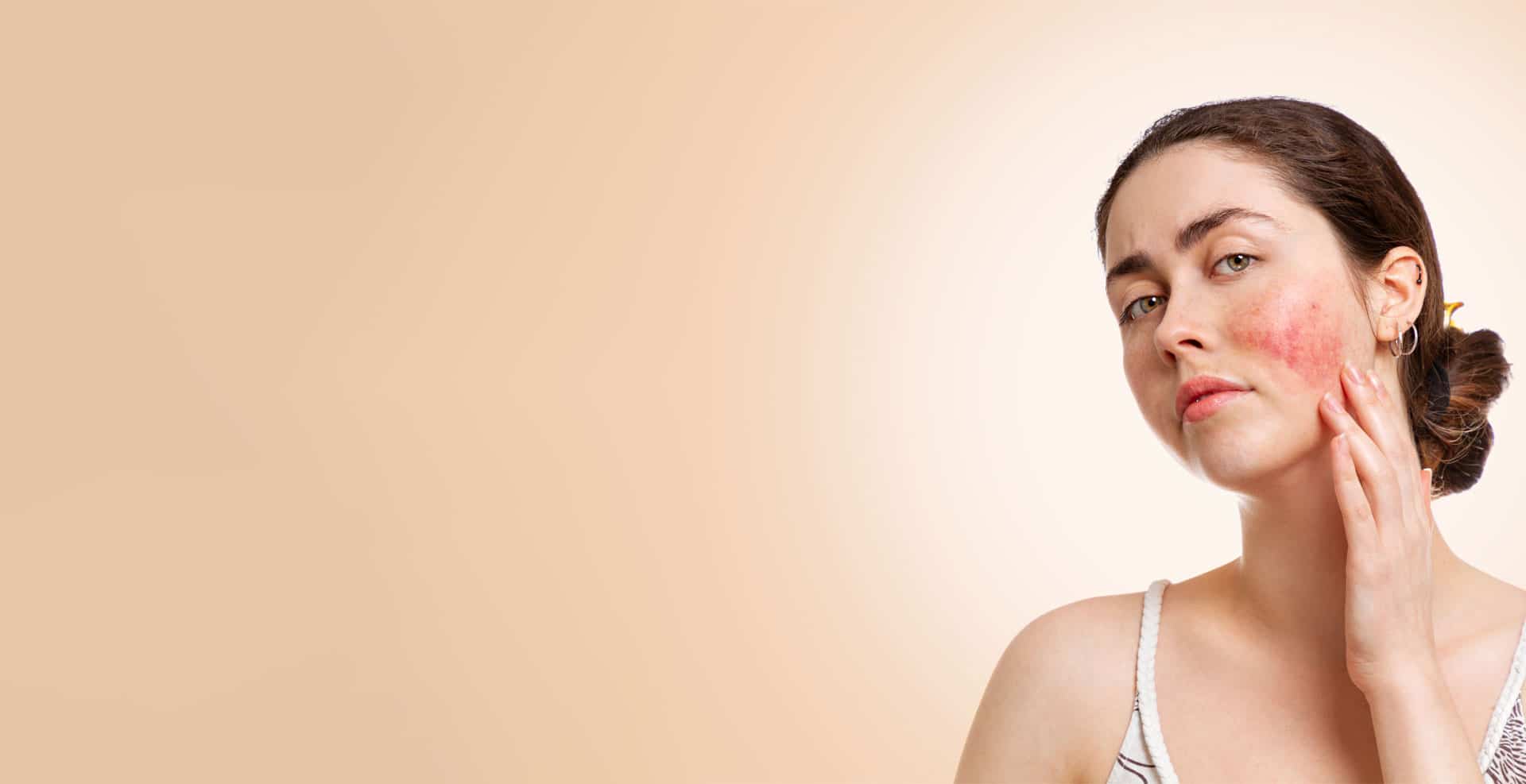
Common Skin Problems
Eighty five million Americans suffer from a skin disorder. Although most skin problems are minor, some can require immediate medical treatment. Let’s take a look at six common skin problems that affect Americans.
- Acne – Acne is one of the most common skin problem affecting teenagers and adults in America. Acne can be caused by several things including hormonal changes, bacteria, or the buildup of dead skin. Acne includes whiteheads, blackheads, nodules, pimples, and cysts, which are commonly located on the face, upper back, shoulders, neck, and chest. If left untreated, acne can cause darkening or scarring.
- Eczema – Eczema causes itchy and inflamed white or yellow patches of dry, scaly skin that flake off. Eczema can affect individuals of all ages, including infants, children, teenagers, and adults. Scratching can cause your skin to thicken. Individuals with allergies are at an increased risk of developing eczema; however, allergies do not trigger eczema. If you develop eczema, avoid scratching your skin as it can worsen the irritation or cause a skin infection.
- Psoriasis – Psoriasis is a skin problem caused by an autoimmune disorder. Approximately 7.4 million Americans are affected by psoriasis. The skin is usually extremely itchy and appears red and scaly. Some sufferers experience pain in the affected area while others only experience itching. Psoriasis often appears on the scalp, elbows, knees, or lower back.
- Rosacea – Rosacea is a chronic skin issue that causes small, pus filled red bumps to appear on the nose, forehead, and cheeks. Rosacea is a cyclic skin condition, meaning the symptoms will go away and return in the future. During a flare up, your skin can become inflamed, resulting in sensitive, scaly, swollen skin with broken blood vessels. Your skin may thicken, you may experience bloodshot, watery eyes, and light sensitivity.
- Skin Cancer – Moles or skin growths that change in appearance over time or cuts, ingrown hairs, or sunburns that take an extended time to heal. There are three different types of skin cancer. Sun exposure can cause basal or squamous skin cancer. Melanoma is found in moles that change over time. Early detection is key to effective treatment. If you notice any irregular growths, or you have a cut that will not heal, contact your doctor immediately.
- Vitiligo – Vitiligo is the loss of pigment. The main symptom of this skin condition is white patches of skin. These white patches often appear in areas that are commonly exposed to sunlight. Those with vitiligo typically lose their hair color early. Vitiligo can affect one area, or it can slowly spread over time. Vitiligo is a chronic skin problem that can affect people of all ages and ethnicities.
Learning how to properly care for your skin is the first step to improved skin health. If you notice something is not right with your skin, it is important to seek out medical treatment. Our integrative practitioners provide a holistic approach to treatment skin problems.
Holistic Skin Treatment
From routine care to serious conditions requiring complex treatment options, our clinicians are here to help. Your skin is the largest organ in the body and it reacts when there is an internal issue or imbalance going on inside the body. For example, digestive disorders like inflammatory bowel disease can cause a multitude of skin problems, including acne, blisters, breakouts, and bumps. Let’s take a look at what you can do to rebalance your body and relieve your skin issues.
We help identify the root cause of your skin issue. Is it an autoimmune disorder, a digestive disorder, a hormonal imbalance, a nutritional deficiency, or a food sensitivity? Once we have some insight on the root cause of your skin disorder, it will help in transforming your skin. Let’s look at the top six ways you can transform your skin.

Balance Your Hormones – Clear Your Skin
When you have a hormonal disorder, it can manifest in your skin. For example-
- Hypothyroidism can cause dry skin
- Androgen can cause oily skin and acne. As estrogen begins to decline, the skin becomes itchier and drier.
- During puberty, you may have experienced hormonal acne as your hormone levels fluctuated.
- Hormonal changes that occur during pregnancy can also affect your skin. As your estrogen levels increase, it causes sun sensitivity and increasing the risk of melasma, which causes dark discolorations of the skin.
- Perimenopause and menopause cause estrogen levels to decline which can result in skin that is dry and itchy.
Rebalancing your hormones through exercise, diet, and lifestyle changes can help improve your skin. In addition to this, you may need bioidentical hormone replacement therapy to clear your skin.

Replace Deficient Nutrients
When you have a hormonal disorder, it can manifest in your skin. For example-
Nutritional deficiencies can cause a host of skin issues. Functional medicine works to determine if you have any nutritional deficiencies like vitamin A, B vitamins, vitamin C, vitamin E or omega 3 fatty acids. Below are some common skin issues associated with nutritional deficiencies.
Acne – Acne can be caused by several things, including hormonal imbalances; however, it can also be caused by a lack of zinc or essential fatty acids (omega 3s) in your diet.
Dry Skin – Dry skin can be caused by dehydration; however, it can also be caused by a nutritional deficiency of potassium. Vitamin A, vitamin D, vitamin E or essential fatty acids.
Small Bumps on the Back of Your Arms – If you have small bumps on the back of your arms, it can signal a nutritional deficiency including vitamin A, vitamin E, omega 3 fatty acids, or zinc.
Replacing these nutrients can be done using a vitamin and mineral supplement; however, experts recommend that most of your nutrition should come from your foods. Eating a diet filled with whole foods is the best way to ensure you are getting the nutrients that you need. Knowing where to get these essential nutrients is half the battle.

Anti-Inflammatory and Whole Foods Diet to Beautiful Skin
An unhealthy diet filled with processed foods, refined grains, and sugar causes systemic inflammation which can affect your skin health. Chronic inflammation can cause acne breakouts, dry skin, redness, and rashes. An anti-inflammatory diet is designed to reduce chronic inflammation and can help restore skin health. This diet is designed to be rich in antioxidants and anti-inflammatory compounds to improve skin health. It includes-
- Eating whole foods such as vegetables, legumes, whole grains, fresh fruits, nuts, seeds, healthy fats, and lean proteins.
- Avoid all processed and refined foods.
- Include dark leafy greens, cruciferous vegetables, and root vegetables.
- Berries and citrus fruits are rich in antioxidants to clear your skin and give it a healthy glow.
- Whole grains like oatmeal and wild rice and beans and legumes help to detoxify the body and promote skin health.
In order to lose weight, its best to make healthy lifestyle modifications like a daily exercise regimen and a low calorie, nutritious diet. In addition to this, practicing stress relief techniques and taking nutritional supplements will get the body as healthy as possible.

Balance Your Gut Microbiome
Your digestive tract is filled with trillions of bacteria (both bad and good bacteria). These bacteria make up what is referred to as the gut microbiota. Your gut microbiota influences actions throughout your entire body including digestion, immunity, and inflammation. When the bacteria become imbalanced and the bad bacteria begin to outnumber the good bacteria, you may develop skin conditions like acne.
There are several ways to balance your gut microbiome and improve your skin health.
- Consume fermented foods like yogurt and kimchi. This helps increase the number of beneficial bacteria in the digestive tract.
- Increase your fiber consumption which improve gut motility and helps to detoxify the colon.
- Decrease your stress through stress relief practices
- Avoiding usage of artificial antibiotics
- Finally, take a probiotic supplement to increase the number of good bacteria in the digestive tract.

Identify Food Allergies or Sensitivities
Food allergies and food sensitivities have been associated with several skin conditions. When you consume a food that you are allergic to, your immune system responds and sends out antibodies to fight off the “foreign invader”. If that food is eaten again, the immune system jumps into action and releases a large number of antibodies. These antibodies release histamine which enacts the inflammatory response. As the inflammatory response occurs, several skin conditions can occur, including:
- Acne
- Cystic bumps
- Eczema
- Hives
- Itchy rash
- Psoriasis
- Rosacea
Some of the common foods that can cause skin issues include tree nuts, eggs, dairy products, gluten, eggs, peanuts, shellfish, soy, and fish. Although these are the most common foods, you can have a sensitivity to any type of food. A food sensitivity test is very useful.

Hydrate
Experts recommend that you get at least one half of an ounce of fluids for every pound you weigh. When you don’t get an adequate amount of water, your skin becomes duller, your pores can become more prominent, and wrinkles may begin to appear. Proper hydration ensures that the skin retains its elasticity and remains plump and supple.






